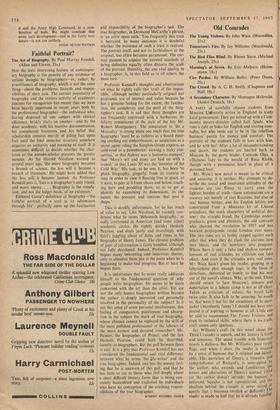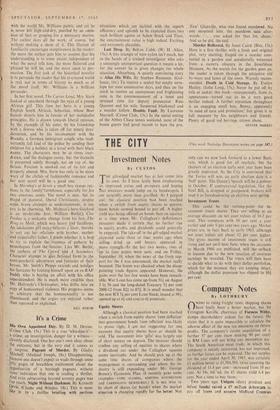HESTER MAKEIG
(7'his week Nicholas Davenport writes on page 345.)
only can we now look forward to a lower Bank rate, which is good ' for all markets, but the chances of an election early next year have been greatly improved. As the City is convinced that the Tories will win, an early election date is a 'bull' point. The Queen's Speech will be a pointer in October. If controversial legislation, like the Steel Bill, is dropped or postponed, brokers will read it as foreshadoWing an election next spring.
Investment Trusts
This could be the turning-point for in- vestment trusts shares. They are selling at an average discount on net asset values of 16.3 per cent. This compares with 10 per cent a year earlier and only 6 per cent two years ago. Market prices are, in fact, back to early 1963, although net asset values are about 12 per cent higher. The gross income of investment trusts is still rising and not until next June, when the accounts to March 1966 are published, will the setback in income due to the new taxation of overseas earnings be revealed. The trusts will then have to decide what to do with their dollar portfolios, which for the moment they are keeping intact, although the dollar premium has slipped to 101 per cent.
Company Notes
By LOTHBURY
r-N WING to rising freight rates, shipping shares have lately been a better market, but Sir Errington Keville. chairman of Furness Withy, damps shareholders' ardour for the future. He states that it is quite impossible to calculate the adverse affect of the new tax measures on future profits. The company's recent acquisition of a further 57 per cent (now making 90 per cent) in RM Lines will not bring any immediate joy. The South American meat trade, in which this company is mainly interested, has not improved, so further losses can be expected. The net surplus for the year ended April 30, 1965, was certainly £f million better at £1,584,504. twice covering the dividend of 11.4 per cent---increased from 10 per cent. At 34s. 6d. xd. the £1 shares yield 6.4 per cent. Not a time to buy them.
Two years ago, Unigate (dairy produce and infant foods) raised a £9 million debenture to pay off loans and acquire Midland Counties Alongside this sensible booklet with its prophy- lactic pink cover I have been reading the Advertising Standard Authority's leaflets on drug advertising. On analgesics, they say: 'Exag- gerated claims about the speed with which a product can relieve pain' are particularly to be avoided. Offhand I can think of three television 'advertisements currently making this kind of claim, as well as others that occasionally build in another undesirable implication described by the ASA as 'vague, unsupported and undefined references to the safety of an analgesic. . . .' Few members of the lay public are yet aware of the dangers of internal bleeding associated with the use of aspirin, for instance. Yet a manu- facturer recently admitted that his researchers could find nothing better or safer.
With cigarette advertising prohibited on the small screen, it is possible to visualise a time , when misleading or exaggerated claims for pro- prietary medicines may meet a similar fate, and not just on commercial television.
An aspect of this traffic that demands investi- gation is the relationship between self-medication ('a wonderful mixture of old wives' tales, tradi- tions, superstitions and hunches . . .,' says Brian Inglis in Fringe Medicine) and the prescription charge. Now that the two-shilling charge has gone, the rise in the cost of prescribing by a quarter to £53,340,000 for February-June this year has again become a war-cry for the familiar group of NHS opponents. But there are no figures for consumer expenditure on what the trade calls counter proprietaries. Fortunately for the phar- maceutical ma::ulacturerc., most of them make both the prescribed. and the branded and ad- vertised medicaments. For them it is swings and roundabouts. For the taxpayer, who is also the bewildered layman, it is a headache without a remedy.
The impact of a well-chosen, longstanding household name, backed by a skilful advertising campaign, cannot be countered for the millions by intelligent in-group propaganda about show- ing that Yellow Soft Paraffin BP costs Is. 6d. a quarter against 2s. 3d. for yellow Vaseline or that Compound Calamine Ointment BP costs less than half the price of Germolene. For one thing, some good folk are just not going to believe that they are equivalents. For another. they may prefer the look, shape and even the smell of the branded product. And perhaps this does not matter.
What does matter, though of course it is far less serious than drug addiction which arises from associated causes, is the possibly harmful effects of self-prescribing, an activity that needs to be restrained rather than encouraged, no matter how fat it makes somebody's bank balance.































 Previous page
Previous page